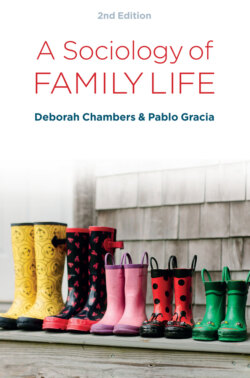A Sociology of Family Life

Реклама. ООО «ЛитРес», ИНН: 7719571260.
Оглавление
Deborah Chambers. A Sociology of Family Life
Table of Contents
Guide
Pages
A Sociology of Family Life. Change and Diversity in Intimate Relations
Copyright Page
Preface and Acknowledgements
Introduction
Themes and issues
Organization of the book
Notes
1 Traditional Approaches to the Family
Late nineteenth-century sociological perspectives
Engels: family, private property and the state
The twentieth-century functional family
Companionate marriage
Community and kinship studies
Race and ethnicity in family studies
Feminism and families
Conclusions
Questions for Reflection and Discussion
2 Individualization, Intimacy and Family Life
Individualization and changing families
Critiques of the concept of individualization
Doing and displaying families
Non-traditional family relationships
Same-sex intimacies and families of choice
Black and minority ethnic kinship ties
Conclusions
Questions for Reflection and Discussion
3 Parenting Practices and Values
Changing parenthood and parenting
Morality and motherhood
Fatherhood: traditional and new models
Fatherhood after divorce
Domestic violence in families with children
Parenting among minority ethnic groups
Parenting in LGBTQ+ families
Conclusions
Questions for Reflection and Discussion
4 The Changing Nature of Childhood
Changing ideas about childhood
Children’s socialization and agency
Children and divorced families
Childhood, social inequalities and consumption
Children, digital media and the home
The privatization of childhood
Conclusions
Questions for Reflection and Discussion
Notes
5 Families and Ageing Societies
Changing dynamics in ageing and family life
Older people and family support
Gender differences among older people
Same-sex relationships among older people
Globalization, old age and kinship in Southeast and East Asian communities
Conclusions
Questions for Reflection and Discussion
6 Globalization, Migration and Intimate Relations
Gendered migration patterns
Globalization, migration and family care
Marriage strategies and mobility
Commercially negotiated marriage
Maintaining cultural traditions in diasporic settings
Transnational mail-order brides
Undocumented migrant families
Conclusions
Questions for Reflection and Discussion
7 Families, Fertility and Populations
Fertility policies from a global perspective
The case of Japan: a low-fertility industrialized country
Romania’s pro-natalist policy under Ceauşescu
India’s preference for sons
China’s one-child policy
Conclusions
Questions for Reflection and Discussion
8 Families and New Reproductive Technologies
Assisted conception and relatedness
Approaches to new reproductive technologies
Donor insemination and the regulation of families
Infertility treatment from a global perspective: the South Asian diaspora
Donor technologies in the Muslim Middle East
Commercial surrogacy in India
Conclusions
Questions for Reflection and Discussion
Notes
9 New Directions: The Politics of Family, Intimacy and Personal Life
The politics of family values
The politics of family, race and nation
Black Lives Matter and extended family bonds
Global and economic dimensions of intimacy, family and caregiving
New intimacies
Friends and family
Personal life
Notes
References
Index
POLITY END USER LICENSE AGREEMENT
Отрывок из книги
2nd Edition
DEBORAH CHAMBERS & PABLO GRACIA
.....
Debates about changes in parenting values and practices are assessed in chapter 3. Changing notions and practices of motherhood, pinpointed by feminist debates, correspond with women’s improved education and entrance into the labour market. The identification of a ‘new’ parenthood that emerges out of separation and divorce has shaped definitions and practice of both mothering and fathering. The theme of parenting is followed by a focus on current ideas about fatherhood and masculinity. New models of fatherhood have been prompted by the erosion of the male breadwinner role, the rise in post-divorce families and families without fathers. Public discourses about a new kind of Dad, based on the model of ‘active fatherhood’, are displacing the notion of the father as ‘male breadwinner’ and unemotional disciplinarian. As a result, fatherhood is being reconstructed in law and social policy. The chapter addresses the idea of ‘involved fatherhood’ promoted by the state in the UK and USA, followed by a critical analysis of the harmful consequences of domestic violence, especially among women and children. The chapter also addresses the issue of parenting among ethnic minority families. Furthermore, the challenges and opportunities faced by LGBTQ+ parents in contemporary societies are examined in the chapter.
Chapter 4 traces changes in childhood. It highlights the tensions between opposing accounts of childhood: a traditional romantic ideal which affirms that the right of a child is ‘to be a child’, and the idea of the child as an active agent with rights. The practicalities of contemporary childrearing practices are set against this romantic ideal and often lead to confusion among both parents and children. Childrearing is now depicted as a negotiation between parent and child, within a process monitored by the state and other agencies such as schools. The impact on childhood of post-divorce families, lone parenting and poverty are examined. Contemporary approaches to childhood draw attention to children’s accelerating contact with the media, commercialism and new digital technologies. Children’s sustained engagement with media devices complicates the idealized and sentimental notion of childhood. For example, the introduction of a wide range of media gadgets into the home, together with children’s access to mobile devices, prompts a renegotiation of household relationships between children and parents. The chapter also shows that in certain non-western societies, childhood is now shaped by elements of privatized and individualized family life familiar to western societies, suggesting that a western trend of home-based privatized childhoods may be a globalizing tendency. Changes occurring in contemporary urban China are outlined to offer an insight into the way these changes are impacting transnationally.
.....